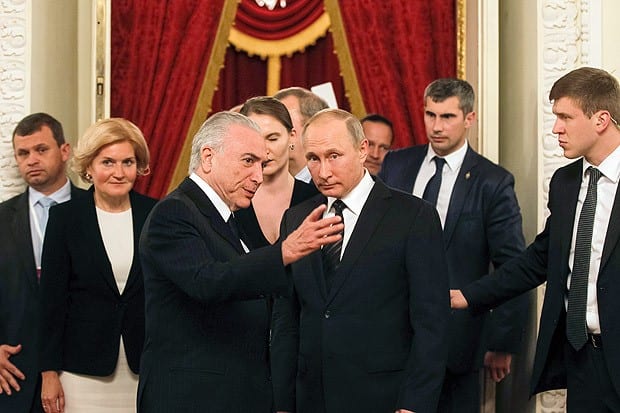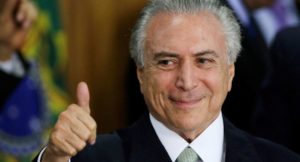
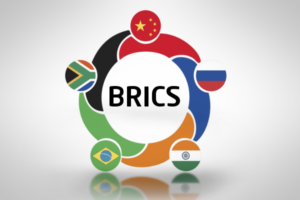
However, time gradually began to put everything in its place. In June of 2017, during his official visit to Russia, the Brazilian President Michel Temer met with the Russian Prime Minister Dmitry Medvedev, the Federation Council Speaker Valentina Matvienko, and the main task in the working schedule of the Brazilian leader was negotiation in the Kremlin with Vladimir Putin. The outcome of these meetings was a “warming” of the degree of Russian-Brazilian relations, strengthening of the ties between the two countries. Within the framework of this visit, Brazil’s role as one of Russia’s main partners in Latin America was repeatedly stressed.
The Brazilian leader began the program of official negotiations with a meeting with the Federation Council Speaker Valentina Matvienko. The interlocutors saw each other almost two years ago in Brasilia, when Temer was the Vice-president. During his current visit to Russia, Temer noted that he was “committed to making a contribution to strengthening ties and strategic partnership”.
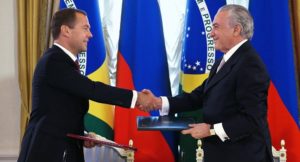
The meeting of Temer with Vladimir Putin took place in the Kremlin. The Presidents signed a declaration on a strategic foreign policy dialogue. The document provides for a higher level of coordination in the fight against new challenges and threats, terrorism, peace, stability, non-proliferation and arms control. Temer assured that in the next half-year, when Brazil will be the temporary chairman in the MERCOSUR, it will try to make every effort to advance in the preparation of an agreement on cooperation with the Eurasian Economic Union (the EAEU). The leaders of the two countries held productive talks for several hours, and the Brazilian leader, in the end of the conversation, stressed that now he will return to his homeland even more confident in the future.
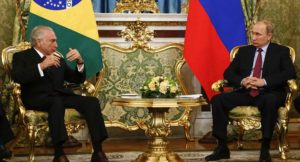
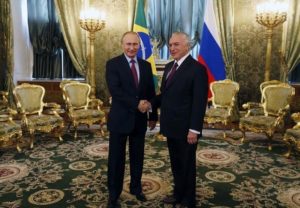
On the 4th of December of 2017 the Secretary of the Russian Security Council Nikolai Patrushev visited Brazil and met with Temer. After this meeting, both noted that the cooperation between Russia and Brazil is still characterized by a high level of understanding and great potential. Within the framework of these talks, Patrushev headed a delegation consisting of members not only of the Security Council of the Russian Federation, but also the Ministry of Internal Affairs, the Ministry of Justice, the Ministry of Defense, the Ministry of Foreign Affairs, the Federal Security Service (FSB), the Presidential Administration for Foreign Policy and the Federal Service for Military Affairs technical cooperation. Such a large format allowed the Russian side to discuss a wide range of issues. After the meeting, many Russian official sources suggested that Brazil intends to “move away” from the BRICS format as the main platform for resolving strategic issues. Patrushev himself publicly stated that “the erosion of BRICS unity for the sake of short-term foreign policy is unacceptable”.
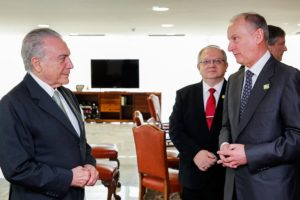
The Russian side noted that the main topics for discussion with Brazil remain paramount: the development of common positions in the UN (including the updating of lists of international terrorist organizations), cooperation in multilateral formats (primarily, in the BRICS), the exchange of experience between the security forces of both countries, the creation of a permanent mechanism of cooperation between the special services of Russia and Brazil, the fight against organized crime and terrorism, and, finally, “familiarization with Russian experience respect to regulating the activities of non-governmental organizations that have signs that they act as foreign agents”.
Despite the “soft coup” that occurred in the Brazilian state in August of 2016, Brazil remains one of Russia’s key partners not only in the Latin American region, but also in the world dimension. The Russian-Brazilian diplomatic relations are almost 190 years old, they were first established on the 3rd of October of 1828. Subsequently, they were interrupted several times: in 1917 after the October Revolution (restored in 1945) and in 1947 because of the establishment of a military dictatorship in Brazil (restored in 1961). Later, the Brazilians were among the first to recognize the Russian Federation as a successor state to the USSR (on the 26th of December of 1991). For many years the main area of bilateral cooperation has been economic. Within the framework of Temer’s official visit to Moscow, the leaders of the two countries supported an ambitious program to build up cross commodity flows and diversify the structure of export-import operations. Many economists believe that there is still undeveloped potential in trade.

Russia and Brazil closely cooperate in the field of space exploration. On the territory of the South American country – four ground stations GLONASS. In 2018, it is planned to study the possibility for joint launches from the Brazilian cosmodrome and the production of small and medium-sized launch vehicles.
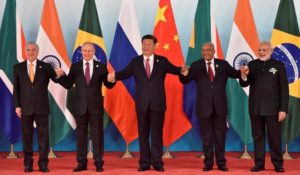
Whether Russia succeeds in maintaining its current position in Brazil will be shown by a series of meetings at the international level scheduled for the upcoming 2018, as well as new economic indicators demonstrating an increase in Russian-Brazilian trade. The first of the scheduled meetings is the “G20” Summit, which will be held this year in the Argentinean capital. In addition, Michel Temer intends to again visit Russia and “root” for the Brazilian team at the World Cup.

